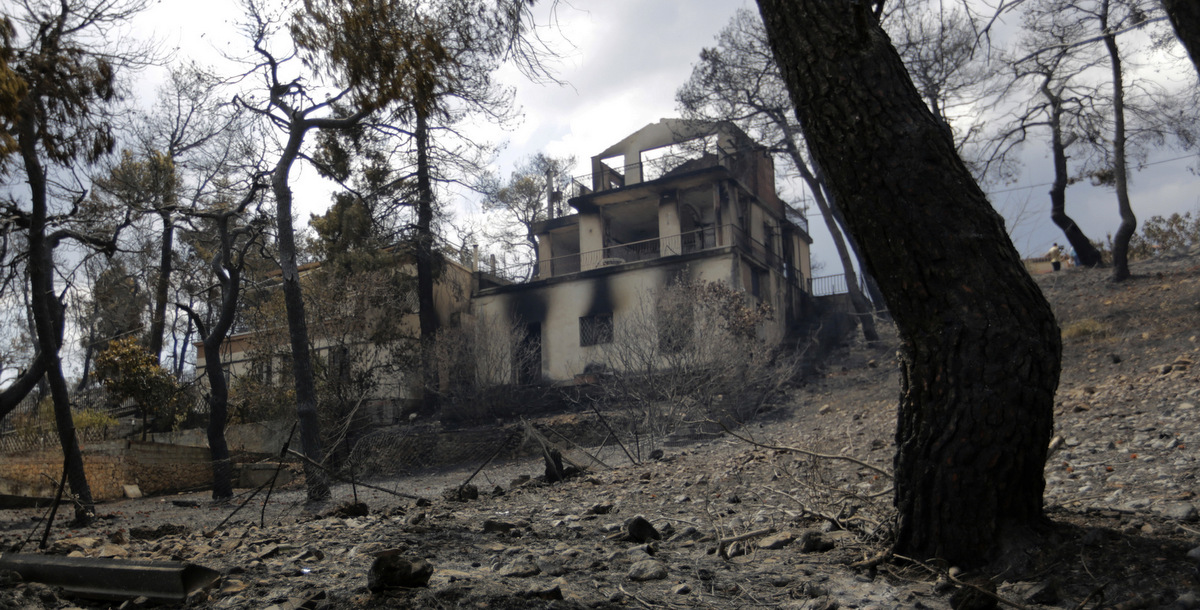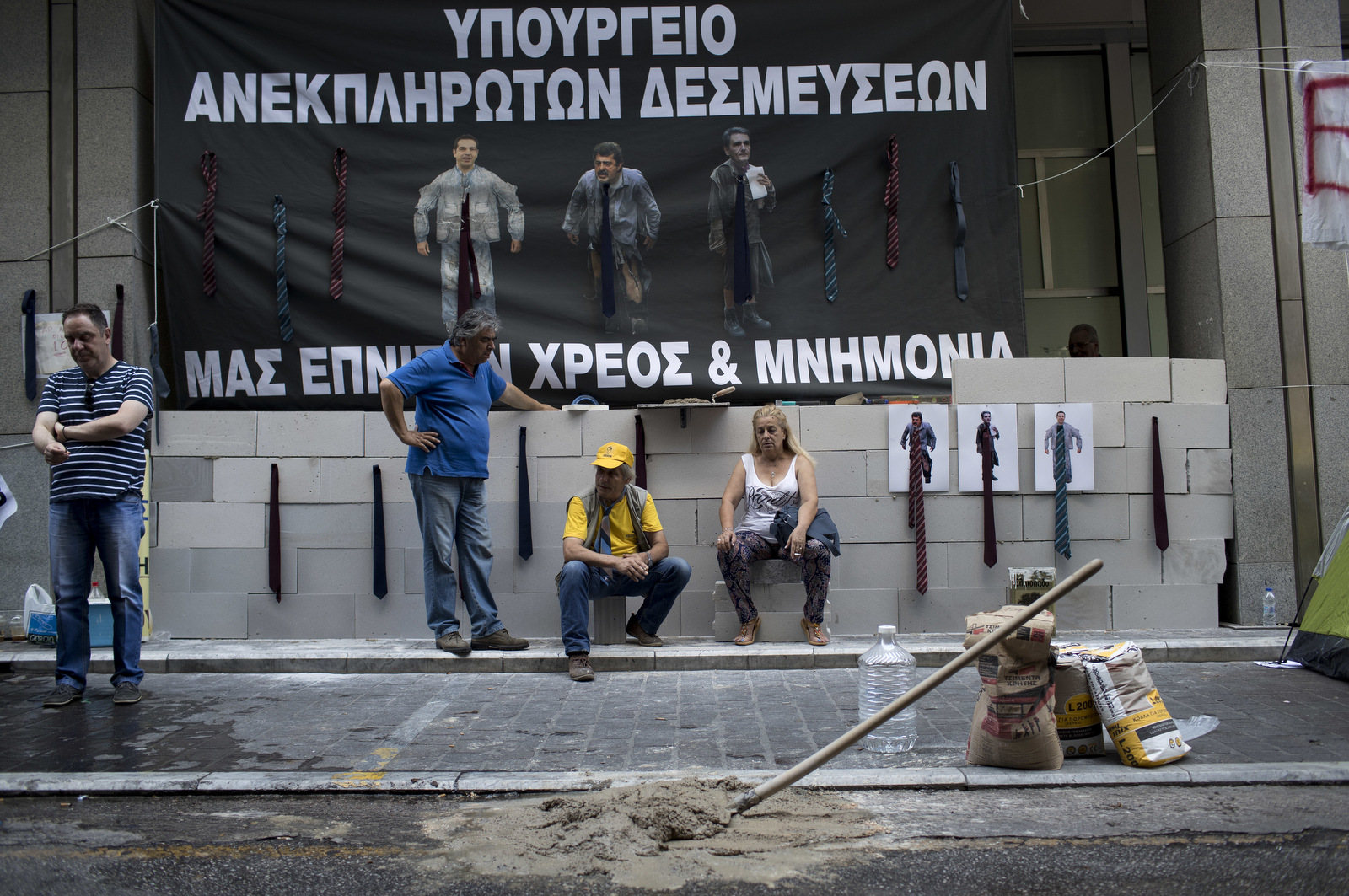By Michael Nevradakis, 99GetSmart
Originally published at MintPressNews

A resident tries to extinguish a forest fire at Kalamos village, north of Athens, on Sunday, Aug. 13, 2017. A total of 53 wildfires broke out in Greece Saturday and more have done so Sunday, including on the beach resort of Kalamos near Athens. (AP Photo/Yorgos Karahalis)
Selling a struggling nation to the highest corporate, oligarchic, and state bidders may be just the way things work in the world, but please stop trumpeting it as a great “success story.” Greece’s forests are burning, its economy sold out, its citizens struggling more than before they were “saved.”
ATHENS, GREECE — (Analysis) Exactly two years ago, on August 14, 2015, the “leftist” SYRIZA-led Greek coalition government — just over a month removed from a referendum that saw 62 percent of voters rejecting a new austerity plan proposed by the “troika” of Greece’s lenders, the European Commission, the European Central Bank, and the International Monetary Fund — put the final nail in the coffin of the referendum result, passing the third, and most onerous to date, memorandum proposal, foreseeing ever-harsher austerity measures, cuts, and privatizations.
Today, the sweet smell of “success” is in the air.
If by success, of course, you meant the smell of charred forest, then you would be correct.
Greece is burning, and not just due to the high summer temperatures. Dozens upon dozens of forest fires throughout the country, which broke out in the space of less than a week, have covered Athens and much of Greece with a choking, smoky haze. Outside of Athens, huge forest fires have raged over a span of over 25 kilometers and, as of this writing, a period of three days, inundating the city with a smoky haze.
It could be said that this is the perfect complement to the winter atmosphere in the city, when Athens is blanketed by a noxious smog, the result of the burning of makeshift fireplaces and furnaces keeping many of the city’s residents warm; residents who can no longer afford absurdly-taxed heating oil or to run electric inverters.
In a 24-hour period between August 13 and 14, 91 fires broke out in Greece. On the island of Zakynthos alone, 22 fires occurred during this period, just a few weeks after earlier fires burned parts of the island, which is a popular tourist destination. Across the strait, the mainland region of Ileia—which was heavily impacted by destructive and large-scale fires a decade ago, in the summer of 2007—once again fell prey to fires that ignited in multiple locations.
Both a blessing—due to their capacity to moderate scorching summer temperatures—and a curse, Greece’s famed August winds, known as the “meltemi,” helped fuel many of these fires and aided in spreading them across large areas, igniting multiple fronts. But the outbreak of all of these fires and the scale of their intensity cannot be attributed to heat and wind alone.
The large fires in Zakynthos and outside of Athens, for instance, began along multiple fronts within minutes, hinting at coordinated arson attacks.
Indeed, evidence of arson, including gas canisters and large convex lenses, have already been discovered in Kalamos, the location near Athens where one of the blazes originated.

Two convex lenses placed next to a large canister of natural gas found near Kalamos, a suburb of Athens.
On August 15, a 62-year-old man, said to be an employee of the Labor Ministry, who was in possession of numerous tools with which a blaze could be lit, was caught and arrested near Mount Parnitha, which itself had been previously reduced to ashes following destructive fires in August 2007. According to Gianna Tsoupra, adviser to the SYRIZA-affiliated regional governor of the Athens region Rena Dourou, such fires are an unfortunate “natural phenomenon.”
Greece burns: who benefits?

Volunteers try to extinguish the fire outside a military base at the village of Varnava , north of Athens, Aug. 14, 2017. (AP/Petros Giannakouris)
These fires could be described as a microcosm of much of what is wrong with Greece — as well as with the institution the country supposedly cannot survive without, the European Union. Greece today is the only European country without a national cadastre (forest registry). While areas classified as forestland are constitutionally protected, this classification is largely based onaerial photography dating back to 1945 or earlier. The results are often comical.
For instance, a portion of the site of Athens’ former international airport—slated for privatization and development by the same SYRIZA government which prior to its election promised to abolish these very actions—has beenclassified as “forestland,” due to the vegetation which existed on the site in the 1937-39 time period. Indeed, the lack of an actual complete registry has led to a number of unintentional — or perhaps intentional — consequences.
Burned land can, for instance, be sold to developers and then reclassifiedafter the fact. A 2011 study by the Athens Polytechnic Institute found that approximately one million structures in Greece were constructed illegally (including on land previously covered by forest). Flexible legislation, such as Greek Law 4014/2011, allows such illegal properties to be “legalized” upon the payment of a fine—a practice viewed favorably for its lucrative income-generating potential by both the Greek government and its “partners” in the troika.
In turn, this practice fuels—pun intended—more and more fires. According to GlobalForestWatch, over 150,000 hectares of Greek forest have been destroyed since 2000, one percent of the total land area of the country.
At the onset of the Greek economic crisis, former government minister Theodoros Pangalos—whose governments oversaw and tolerated many of the aforementioned practices—stated, in an attempt to ascribe collective guilt and blame to the entire populace for the causes of the crisis, that the Greek people “ate it all together,” implying that the citizenry collectively took advantage of corruption and graft for its own benefit.
As with many attempts at stereotyping, there is a grain of truth in this statement. On the island of Crete for instance, the “Residents Outside Town Planning” club represents approximately 45,000 illegal homeowners.
However, the beneficiaries of such practices extend beyond just a certain segment of the Greek populace. “Ex-pats” who have relocated to Greece from countries considered by many self-loathing Greeks as “civilized” and “law-abiding” have taken advantage of such laws to purchase properties constructed illegally. Indeed, “ex-pats” looking to purchase property in Greece are even advised as to how an illegal property can be legalized. These very same “ex-pats” — reflecting arrogant, time-honored colonial habits that die hard — are known for lecturing the clearly lazy, wayward, and corrupt Greeks for engaging in such terrible practices as “tax evasion” through the withholding of receipts for small purchases.
Meanwhile, Greece continues to reap the benefits of its membership in the “European family”—where, we are told, in a position supported by the entirety of the political representation in the national parliament, the country must remain “at all costs.” With Greece in flames, the EU’s Civil Protection Mechanism obliged Greece’s fire service, already stretched thin due to fires at home and EU-supported economic austerity, to send two firefighting planes to Albania to battle forest fires in that country.

A woman with a bucket walks among burnt forest land during a wildfire near the suburb of Kaisariani in eastern Athens, on, Aug. 10, 2017. (AP/Petros Giannakouris)
Conversely, no corresponding mobilization seems to have occurred at the EU level to fight fires in Greece. France, for instance, felt no need to display “solidarity” towards its “European partner,” refusing a request to send aerial firefighting aircraft to Greece, citing its own difficulties with fires. It is unclear why Greece could not respond in the same manner to the EU’s demands to send planes to Albania.
In a tacit admission of who truly controls the purse strings in Greece, Giorgos Patoulis, the mayor of the northern Athens suburb of Maroussi and president of the Hellenic Union of Municipalities (KEDE), admitted in a radio interviewthat Greece’s limited resources to fight fires via aerial means are a direct consequence of the actions of those who control the country’s public spending. Since 2016, when the Greek Parliament essentially voted itself voteless, Greece’s annual budget has been determined by the EU itself.
Greece: Business as usual?

Israeli Prime Minister Benjamin Netanyahu, left, talks with Greek Prime Minister Alexis Tsipras during their meeting in Thessaloniki, Greece’s second largest city on Thursday, June 15, 2017. Under heavy security Netanyahu is in northern Greece to discuss plans to become a key supplier of European energy through an ambitious Mediterranean undersea natural gas pipeline project. (AP/Giannis Papanikos)
Following the 9/11 attacks in the United States, with a country in mourning, then-president George W. Bush famously uttered that America was “open for business.” The current government in Greece is apparently following the same playbook.
The SYRIZA-led government, many of whose members once participated in protest movements against apartheid Israel’s actions in Palestine, recently agreed to expedite efforts on the development of the EastMed pipeline, which would transport natural gas from Israeli gas fields to Greece, Italy, and Cyprus, in a project co-financed by the European Union and previously supported by the Obama administration.
Oddly enough, the proposed pipeline route includes a 600-kilometer overland route in mainland Greece, passing right through the Mani region of the Peloponnese that burned to the ground in early July.
Legislation currently being considered would officially declassify urban green spaces, such as parkland, that are currently considered “forestland” and protected by existing constitutional provisions. Loosening these protections would open the door to the economic “development” of the little remaining green space in Greece’s overcrowded, densely-populated, and haphazardly-planned cities. Meanwhile, in December the Greek Parliament passed Law 4442, Article 33 of which relaxes prior regulations on economic activity and the economic development of Greece’s archaeological sites. This law was passed at the behest of Greece’s so-called “saviors” in the troika.
According to Greek Prime Minister Alexis Tsipras though — as well as to the global neoliberal press that fawns over him and his commitment to the “bitter medicine” of austerity — all is well in Greece and the sweet smell of success, rather than that of smoldering ashes, is indeed in the air. In an absurd and comical interview published by the bible of “leftists” worldwide, The Guardian, on July 24, Tsipras described a reality in which apparently only he, his fellow government ministers and members of parliament, and his supporters in the press and the troika apparently reside.
In this interview, Tsipras claimed that “the worst is clearly behind us,” that Greece’s economy is “on the up,” and that his government “will extract the country from the crisis.” He excused his rejection of the referendum result of July 2015 as a “compromise” that prevented Greece from turning “into Afghanistan.” This statement reflects the same blatant fearmongering about the impact of a Greek departure from the EU and Eurozone that is practiced by the Greek and international mass media — which purportedly have fought the “leftist” government of Tsipras — and by the main Greek opposition, the neoliberal-right New Democracy party.
The “objective” Guardian could not conceal its support for Tsipras’ brand of neoliberal “leftism,” peppering the article with language excusing away the actions of Tsipras and his government. SYRIZA’s first-place finish with 36 percent of the vote in the September 2015 elections amidst record voter abstention is described as a “mandate,” while the austerity measures imposed by the troika are described as a “rescue programme” that may be accompanied by “much-needed debt relief.”
Tsipras himself defended his government’s position — to never consider an exit from the Eurozone and the EU — on the grounds that Europe would lose an important part of its history and heritage, an ironic statement when one considers that it is Greece that is losing its history, heritage, culture, language, and especially its sovereignty as a result of its membership in these institutions. This statement did, however, echo Tsipras’ January 25, 2015 victory speech that accompanied his initial ascent to power, a speech that contained constant references to “saving Europe” but no references to saving Greece, the country he was elected to govern.
One day after this puff piece was published by The Guardian, the SYRIZA-led government and the international media (including, you guessed it, The Guardian) triumphantly proclaimed Greece’s “return to the markets” — as Greece “successfully” held its first bond sale in three years, selling 3 billion euros’ worth of five-year bonds at a yield (interest rate) of 4.625 percent.
Compare this to the yields of other EU member-states as of August 15, including Belgium (-0.191 percent), France (-0.146 percent), Germany (-0.284 percent); crisis-hit countries such as Italy (0.7 percent), Portugal (1.089 percent), and Spain (0.217 percent); or even Romania (2.6 percent). It is evident that the idea of a common market and a common currency falls flat on its face. Greece’s 4.625 percent yield can also be compared to those in such economic powerhouses as Malaysia (3.622 percent), Botswana (4.2 percent), the Philippines (4.659 percent), and Vietnam (4.681 percent).
The government of EU and Eurozone member-state Greece is — in honor, it would seem, of Pyrrhus and his “victory” — celebrating its ability to once again borrow on the international markets, at rates comparable to those of Vietnam and the Philippines and worse than Botswana, in order to repay the “bailouts” (in reality, loans) received from its creditors in the troika — which were used to repay the debt that is blamed for thrusting Greece into its current economic predicament in the first place!

Greek Prime Minister Alexis Tsipras, left, welcomes European Commissioner for Economy Pierre Moscovici at Maximos Mansion in Athens, July 25, 2017. Greece is poised to tap international bond markets for the first time in three years in a move the government claims will signal the country is ready to emerge from its bailout era. (AP/Thanassis Stavrakis)
Reality, however, must not be allowed to interfere with the sweet scent of success. Hence another one of the Greek government’s and troika’s recent success stories, the purported “loosening” of Greece’s capital controls, imposed under the watch of the supposedly “heroic” former finance minister Yanis Varoufakis, which have restricted withdrawals from Greek bank accounts since June 28, 2015. Earlier in August, the Greek government announced a new limit on withdrawals from Greek bank accounts of 1,800 euros per month, replacing the previous limit of 840 euros every two weeks.
Simple math, however, demonstrates that the Greek government and its backers in the troika must consider the Greek people extremely stupid: an 840 euro withdrawal limit each two weeks amounts to a maximum of 21,840 euros per year, while a 1,800 euro monthly withdrawal limit equates to 21,600 euros annually — a reduction, in other words. The Guardian, however, joined the Greek government and most of the press corps in describing this as a “relaxation,” and further evidence of Greece’s “success story.”
Notably, this is not the first time that “fuzzy math” has been used to “loosen” Greece’s capital controls. When initially imposed, a limit of withdrawals of 60 euros per day was established. This 60 euro daily limit was “relaxed” in September of 2015 to a weekly limit of 420 euros, which again equates to 60 euros per day.
In July 2016, this limit was again “loosened”—by permitting withdrawals of 840 euros every two weeks, which again equated to 60 euros per day and 420 euros per week. The current annual limit of 21,600 euros comes out to a daily mean of 59.18 euros per day, less than when the capital controls were initially imposed in 2015!
Greece’s “success story” is indeed so great that Greek justice minister Stavros Kontonis, in interviews with Greek state television ERT and state news agency ANA-MPA, stated his belief that the recent spate of fires in the country is the result of an “organized plan to destabilize the country” hatched by unnamed elements who do not wish to see Greece’s economic “recovery” continue.
EU and media hypocrisy at its finest
On August 1, the former head of Greece’s Statistical Authority (ELSTAT), one-time IMF staffer Andreas Georgiou, was issued a two-year suspended prison sentence by a court of appeals in Athens on charges of breach of duty. Georgiou had been accused by whistleblowers such as Zoe Georganta, a former member of ELSTAT’s board of directors, of manipulating Greece’s deficit and debt figures to cause them to appear worse than they were in reality, thereby providing the political impetus necessary to drag Greece under the troika’s austerity and privatization regime. While the charges of breach of duty related to the lesser crime of having sent data regarding Greece’s 2009 budget deficit to Eurostat without consulting with ELSTAT’s board, this nevertheless represented a victory for those in Greece who have stood opposed to the austerity policies of the past eight years.
Opponents of “Brexit” and proponents of the European Union often hysterically claim that without the EU, human rights would somehow fly out the window. They must not have seen the reaction to the Georgiou case and the eventual verdict, on the part of the Nobel Prize-winning EU. European Commission coordinating spokesperson for Economic and Financial Affairs, Annika Breidthardt, expressed “concern” over the Georgiou ruling, claiming that ELSTAT’s independence was breached and that its members were not being “protected in line with the law,” further adding that the case would be examined by the Euro Working Group this autumn and that an appeal would be a possibility.
Prior to the verdict, Margaritis Schinas, the Greek-born chief spokesperson of the European Commission and former member of the European Parliament with the New Democracy party in Greece, again relayed the Commission’s disappointment and waning trust in Greece over the charges Georgiou was facing. Most damningly though, it was revealed that one of the requirements that the Greek government was obliged to enforce, in order to receive an 8.5 billion euro tranche of loan funds (which had already been earmarked for Greece due to the prior implementation of other troika demands), was to fully cover the cost of Georgiou’s legal defense. Coincidentally, of course, soon after these concerns were raised, a clause inserted into legislation pending before the Greek parliament provided for the full payment of Georgiou’s legal defense costs by the Greek state, via ELSTAT.

Andreas Georgiou, stands outside the headquarters of the Statistics agency, in Athens, Greece. (AP/Petros Giannakouris)
Following the European Union’s lead, the press corps could not conceal their disappointment, seething over Georgiou’s guilty verdict. In an August 4 editorial, Bloomberg described the prosecution of Georgiou as “scandalous” and as “punishment” for “cleaning up” Greece’s finances. That same day, The Washington Post — owned by Jeff Bezos of Amazon and CIA fame, and quick to label independent news sites such as Mint Press News as “fake news” — stated in an editorial that Georgiou was “scapegoated” and was “only doing his job.” The Financial Timescharacterized the Georgiou trial as a “farce,” warning that the decision would “drive a wedge between Athens and euro area creditors.”
In turn, a ludicrous Politico hit piece claimed that Greece “condemned itself” by “convicting an honest statistician” in a decision that “raises questions about the integrity of the country’s institutions.” The author of this particular article, Megan Greene, seems to have taken on the side job of being Georgiou’s public advocate on Twitter, where she also has publicly demonstrated comfortable relationships with editors from Greece’s neoliberal newspaper of record, Kathimerini, and with Greek politicians.
Interestingly, the “integrity” of Greece’s “institutions” was not called into question when, for instance, the Areios Pagos, Greece’s supreme court, ruled in early July that legislation rolling back Greek worker rights — which was implemented as part of Greece’s second memorandum agreement with the troika, and passed by the government of the non-elected technocrat prime minister and former central banker Lucas Papademos — was constitutional. According to the decision issued by the court, the laws in question had the purpose of increasing the “competitiveness” of Greek businesses and it followed that the resulting decrease in labor costs (wages) was therefore in the public interest.
Not a word of protest was uttered by the European Commission, the Financial Times, The Washington Post, Bloomberg, Politico, Megan Greene, or Kathimerini over this decision. Nor was the integrity of Greece’s judicial institutions questioned when, later in July, an appeals court in Athens ruled that wage reductions of up to 45 percent were “legal and constitutional.” Again there was silence from the European Commission and its supporters in the press corps.
Indeed, instead of protest, the president of the Areios Pagos was rewarded: just days after the decision that found that the troika-imposed cutback in worker rights was constitutional, the president of the court, Vassiliki Thanou-Christophilou, was hired as the supervisor of the legal office of prime minister Tsipras, purportedly on a non-salaried basis. Notably, Thanou-Christophilou had also served as Greece’s caretaker prime minister for approximately one month, prior to the September 2015 parliamentary elections.
A “success story” – on paper only
Clearly congratulating himself on a job well done, Tsipras is now reportedly taking a vacation, while much of the country is up in flames, literally and figuratively. And why not? Tourism is said to be breaking records; unemployment is claimed to be on the decline; a primary budget surplus has been achieved; the current austerity program is claimed by Tsipras to be set to finish in 2018; the government is again claiming it will launch a television and radio licensing process to “go after” Greece’s oligarchs, and Greece is even reported to be launching talks to join the BRICS’ development bank. Sounds great, right? Let’s deconstruct these claims.
The August full moon has become an annual commemoration in Greece. Occurring during the peak of Greece’s tourist season, the night of the August full moon is a time when museums and historical sites throughout the country open their doors to the public, hosting free tours and live concerts.
This year, the August 7 full moon was accompanied by a partial lunar eclipse. And, this year’s crowds at museums and historical sites were larger than in previous years. This could be attributed, in part, to tourism. Greece is expecting to achieve record tourist arrivals, which this year are projected to surpass 30 million visitors.

The August full moon rises above the 5th Century BC Temple of Poseidon at Cape Sounio, south of Athens, on Aug. 7, 2017. More than a hundred of Greece’s ancient sites _ but not the Acropolis in Athens _ and museums were kept open until late Monday and concerts organized to allow visitors to enjoy the full moon, which is accompanied by a partial lunar eclipse. (AP/Petros Giannakouris)
There is another factor, however: while foreign tourists are arriving in Greece in droves, Greek residents are increasingly stuck at home — unable to afford even a brief vacation inside their own country and deprived of the opportunity to enjoy Greece’s beautiful beaches, islands, and countryside even for a few days. A 2016 study found that domestic tourism has decreased by 45 percent during the crisis.
Athens neighborhoods that used to resemble ghost towns during August, were this year only moderately less vibrant than during the rest of the year. Unable to afford a vacation, many Greeks stayed home—and likely attended those free full-moon events in record numbers.
Of course, privatizations were supposed to “save” Greece, including Greek tourism, justifying the sell-off of 14 profitable Greek regional airports and the port of Piraeus, the largest port in Greece and one of the largest in Europe. The 14 airports were purchased by a consortium of investors led by Fraport, owned by the German state.
Proponents of privatization in Greece, conditioned over many decades to demonize anything and everything that is publicly owned or operated, argued that this investment was necessary to “improve” these airports and their “efficiency.” Those “improvements” are already evident, as complaints have been rolling in from travelers and employees alike: extremely long queues and a lack of air conditioning have been reported to be commonplace to a far greater extent than in the past, indeed the new normal, while parking privileges for employees at the Fraport-owned airports have all but been curtailed.
Quite fittingly, the final agreement that was reached between the Greek government and Fraport for the privatization of the 14 airports was based on a royal decree enacted by Greece’s “pro-western” post-war government in 1953 and signed by King Paul, of German lineage through the House of Schleswig-Holstein-Sonderburg-Glücksburg.
Such privatizations have been touted as “investments” that provide far-reaching benefits and jobs to the Greek economy, and as signs of investor confidence in Greece. The benefits they have actually provided Greece, however, are dubious, as seen in the case of Fraport. This is also evident in the case of the Chinese-owned Cosco, which purchased a controlling share in the entire port of Piraeus from the Greek state in 2016, and which had previously purchased the container port of Piraeus in an agreement with the then-government of the Panhellenic Socialist Movement (PASOK) in 2011. What Cosco seems to have actually delivered to Piraeus are Chinese-style labor conditions, under which workers are, for instance, encouraged to urinate into the sea instead of taking toilet breaks.
From a tourism standpoint, however, these privatizations are part of a larger negative trend that goes largely unreported: the profits from these airports and seaports, which previously entered public coffers, now go straight to Germany and China. In the meantime, the “all-inclusive” and cruise-ship models of tourism are those that have been most vigorously developed in recent years.
This means that foreign visitors often arrive in Greece via foreign-owned charter airlines or cruise ships, on vacations that are usually booked with foreign travel agents and tour operators. They then spend most of their time on the cruise ship or inside an all-inclusive resort, contributing very little spending to the real economy. This is evidenced by statistics showing that despite Greece’s record arrivals, spending per tourist is on a decline, at a mere 430 euros per visitor, 15 percent less than Greece’s nearest competitor in the region.
China, of course, is also a member of BRICS, and it has been reported in recent weeks that Greece has entered talks to formally apply for membership in the BRICS’ New Development Bank. Many opponents of neoliberalism around the world have touted BRICS as an alternative to the existing economic order. But is it really? China’s labor record, for instance, suggests otherwise — as does the Temer regime currently at the helm in Brazil, a favorite of Washington, which is currently enforcing troika-style austerity and is embroiled in corruption scandals. The same could be said of India, which is on board with much of the Western world’s efforts to eliminate cash and physical currency.
But what about Russia? Many in Greece believe that Russia and Vladimir Putin can “save” Greece—if only Greece would turn its back on the Eurozone, EU, and NATO. Throughout the crisis, it has been rumored that there were secret plans for Greece to turn to Russia if it could not achieve “bailout” deals with the troika, but there seems to be no real evidence that Russia ever had such an aid package prepared for Greece, or that it was ever willing to provide such assistance. What is clear, however, is that Russia, like China and like Germany, sees fertile ground in Greece for its own investments.
In Febrary 2016, a series of economic deals were signed between Greece and Russia. At the time, the Russian government expressed its interest in a number of potential privatization deals in Greece. Flashing forward to April of this year, a majority share (67 percent) of the port of Greece’s second largest city, Thessaloniki, which is viewed as a strategic gateway to the Balkans, was privatized. The buyer? The Deutsche Invest Equity Partners-CMA consortium, in which a major investor is a business figure by the name of Ivan Savvidis.
Who is Savvidis? Born in Georgia when it was part of the former Soviet Union, Savvidis was employed in a state-owned tobacco factory during the Soviet years, becoming its general director soon after the collapse of the USSR and subsequent privatization of the factory. Savvidis was previously a deputy with Russia’s ruling party, United Russia, in the country’s parliament. He is also chairman of the SKA Rostov-on-Don football club in Russia.
Prior to the 2010s, he was unknown in Greece, and there is some question as to whether he had even visited the country. In recent years, however, he has made his presence felt in Greece—especially since SYRIZA ascended to power. It could be said that he’s followed the path to power and influence that is preferred by the Greek oligarchic class.
His first big splash was through the purchase of the PAOK football club in Thessaloniki, joining the ranks of other oligarchs who own football teams in Greece. His group of companies has made various investments in Greece, such as in the field of tourism, where he has bought out various hotels and established an aviation company.
More recently, Savvidis began his foray into Greece’s utterly corrupt media sector, first via his participation in last year’s licensing bid for nationwide television licenses — a process ultimately struck down by Greece’s highest administrative court due to constitutional irregularities. Unabated, he has purchased the major daily tabloid Ethnos and financial newspaper Imerisia, as well as a share in the financially struggling national television station Mega Channel. These purchases were followed by his buyout of another national television station, Epsilon TV, earlier this month.
These purchases have solidified Savvidis’ place in the Greek media landscape, just in time for the relaunch of the licensing bid for nationwide television stations by the SYRIZA-led government. Following the rejection of last year’s bidding process by Greece’s administrative high court, the government has set up a new bidding process, this time in conjunction with the purportedly independent national broadcasting regulator, but which repeats many of the same lies that were heard prior to last year’s bid. These lies pertain particularly to the number of stations that the television spectrum can “fit” — a number that has now increased to seven national stations from four last year, but that is still far fewer than in other countries (such as Italy), and that all but ensures the continuation of an oligopoly controlled by a few powerful actors, namely Greece’s traditional oligarchs and more recent entrants like Savvidis.
For the SYRIZA-led government, however, this forthcoming television licensing bid—which is said to be likely to extend to radio as well, with onerous requirements that smaller and rural stations will likely be unable to fulfill—represents another part of its “success story,” via the “fulfillment” of one of its many campaign promises, namely to “restore law and order” to the broadcast landscape. In reality, though, whereas the main opposition party SYRIZA promised to “crush” the oligarchs once in power, it is now preparing to turn the media landscape over to them officially. It should be noted at this point that the entirety of Greece’s major media owners have maintained, throughout the crisis, a staunch and unflinching pro-EU, pro-Eurozone, pro-austerity line.
The puff piece published by The Guardian touted the drop in Greece’s official unemployment rate to 21.7 percent, from a peak of 27.9 percent in 2013, as yet another aspect of SYRIZA’s “success story.” Much is left unsaid, however: the long-term unemployed, who are not counted in the statistics; the 500,000-plus person “brain drain” out of Greece during the crisis years; the poor working conditions and paltry wages of many of those who are still employed; part-time jobs that are counted as “full” employment; the aforementioned rollback of worker rights; the job insecurity that workers face, including going months at a time without pay or enduring unpaid overtime, and their fear of leaving due to the uncertainty of being able to find any other job; and so forth.
Just the 500,000-plus person brain drain alone would be enough for Greece’s unemployment rate to skyrocket, had these individuals not emigrated.
Ah, but Greece has attained—and maintained—a primary budget surplus, which reached 3.05 billion euros in the first seven months of 2017. That’s good news, right? Not if one considers what a primary budget surplus actually is. Briefly, it means that the Greek state is spending less than it is taking in as revenue. While this may sound prudent, what decades and centuries of experiments in economic austerity have demonstrated is that for countries experiencing a severe economic depression, as in the case of Greece, maintenance of a primary budget surplus merely exacerbates the problem: money is sucked out of the real economy and not returned to it.
As spending continues to decrease in a cash-starved economy where taxes are increasing and wages are declining, more and more cuts have to be made to government spending in order to meet surplus targets, perpetuating a never-ending death spiral.
In the case of Greece, the SYRIZA-led government, in an agreement with the troika earlier this year, pledged to maintain a primary budget surplus of 3.5 percent of its GDP each year through 2023, and 2 percent annual surpluses thereafter until 2060. Tsipras’ claims, therefore, that Greece’s austerity program will come to a close sometime in 2018 are laughable: the maintenance of primary budget surpluses is, by definition, the continuation of austerity—which Greece has pledged to continue for (at least) the next 43 years!
But nevertheless, the smell of success is in the air. Prime Minister Tsipras and The Guardian say so, after all. The problem is, that scent hasn’t been detected by ordinary Greeks or by small business owners. Just in the first half of 2017, more than 15,000 businesses shuttered in Greece. But while the SYRIZA-led government is preparing to “crush” Greece’s oligarchs — who, like oligarchs the world over, evade their fair share of taxes by shifting profits offshore — the state has gotten to the bottom of Greece’s supposed problem with tax evasion via other apparently more effective means.
In July, a man who has been unemployed since 2010 and whose income consisted of 24 cents in interest from his bank account, was issued a 4,470 euro tax bill, as the Greek tax system presumes that citizens have a certain income level if they have a bank account, home, or automobile in their possession—even if they are unemployed, even if the property was inherited, even if the citizen is in fact currently impoverished.
In another case, a 49-year-old man in the town of Almiros was arrested and fined for the offense of selling 20 watermelons and 12 cantaloupes without a valid license. Greece’s television and radio stations, however, have operated without official licenses for decades, without anyone so much as batting an eyelash.
In yet another example, if you are a property owner in Greece, rental leases must now be submitted electronically to the tax authorities, with the owner immediately taxed on a percentage of the foreseen rental income for the entire year—before that income has been earned for the year! If, as in the case of a neighbor of this author in Athens, a renter skips town without having paid rent, the owner is nevertheless taxed on this “income.” The deadbeat tenant’s inability to pay–and your consequent taxation on “income” never received–is apparently your problem, not that of the tax office or finance minister!
An uncertain future, not a “success story”

A house damaged by the forest fire stands among pine trees north of Athens, at Kalamos, on, Aug. 16, 2017. (AP/Ioanna Spanou)
As this piece is being written, the smoky smell of the fires raging outside of Athens still hangs ominously in the air, on a day that is supposed to be a national holiday in Greece. For the prime minister and the members of the SYRIZA-led coalition government — as well as for the unabashedly pro-EU, pro-euro, pro-austerity press corps — it is the sweet smell of success that is hanging in the air. Success that exists, if at all, on paper only, as far removed from reality as the government that is nominally in control of the country, and the European and international institutions that are actually at the helm — in Brussels, Berlin, and elsewhere.
A decade ago, in the summer of 2007 and in the aftermath of the aforementioned destructive fires on Mount Parnitha and the Ileia region, an anonymous call went “viral” via SMS text messaging and bloggers, calling upon citizens to wear black and to descend upon Athens’ Syntagma Square, and other central points throughout Greece, for a “non-partisan” protestagainst the then-New Democracy government for its response to the blazes. This was perhaps the first such protest in the country’s modern-day history. Strangely, following the destructive fires of this summer and despite almost ubiquitous smartphone and social media usage, no such similar calls have been extended.
Were the 2007 protests an aberration? Possibly. In Greece, the “Indignants” movement disappeared, never to reappear again, after the summer of 2011 and a last hurrah in February 2012 consisting of protests against the second memorandum. In the weeks leading up to the 2015 referendum, a “Solidarity with Greece” movement emerged in major cities in Europe and North America, where academic leftists and ivory-tower activists who somehow were able to procure large quantities of SYRIZA flags, organized rallies against the “blackmail” and “coup” SYRIZA and the Greek people were facing at the hands of the European institutions — which were apparently not evil enough, however, to warrant advocating in favor of “Grexit.”
Following SYRIZA’s wholesale rejection of the referendum result though, an interesting thing happened: this “solidarity” movement largely disappeared — as did its rallies, though perhaps not the SYRIZA flags. Today, a key participant in these rallies, Irish author and “eurocommunist” activist Helena Sheehan, is shilling her recently-published book, Syriza Wave: Surging and Crashing with the Greek Left. Sheehan has taken advantage of the public catfight between Tsipras and Varoufakis to generate some extra publicity for her book, which she admits she was not the best qualified to write.
Nevertheless, Sheehan gently chides SYRIZA for its capitulation and its supporters’ broken dreams, but does not question the European path followed by SYRIZA and by its predecessors before it. The “European dream” and open borders are a good thing, whereas restoration of national sovereignty is “fascist.” Sadly, there was no word from Sheehan as to when the “solidarity” rallies would take to the streets once more.
Returning to political reality, opinion surveys in Greece, to the extent that they can be trusted, consistently show the former governing party, New Democracy, with a steady and sometimes overwhelming lead. Popular sentiment on the street is that whenever new elections are held again, New Democracy will emerge victorious—though it is likely that they too will fall far short of a parliamentary majority, even with the 50-seat parliamentary bonus undemocratically awarded to the winner.
Just in case anybody believes New Democracy will represent a change in direction for Greece though, they would be wrong. It was two years ago when, following the referendum that overwhelmingly rejected the troika’s new austerity proposal for Greece, the SYRIZA-led government turned its back on the result and rammed through memorandum agreement number three for Greece, upon which much of today’s continued cuts, privatizations, and austerity are based.
However, the third memorandum could not have been successfully passed in parliament without the votes of the members of former ruling New Democracy and “socialist” PASOK parties, as well as upstart pro-establishment party To Potami. New Democracy, like SYRIZA today, brought Greece back to the international financial markets via a bond tender in late 2013 with a similarly high yield — and, like SYRIZA, declared Greece a “success story” and claimed the end of the crisis was nearing.
For Greece’s “saviors,” there’s a scent of success in the air. But for the rest of the Greek populace, what’s in the air, literally and figuratively, is the scent of destruction. In a country where, over the past decade and more, Greece’s agriculture, industry, economy, the dreams of its people, and the country’s future have been methodically burned, why not the nation’s forests as well?
















 ABOUT THE AUTHOR
ABOUT THE AUTHOR


 About the author
About the author